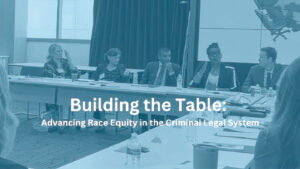Historic report issued on advancing race equity in the criminal legal system
By Bryan Hay
Prof. Adam Biener had a front row seat during the development of a groundbreaking paper that addresses race equity in the criminal justice system, the first time that all of its representatives met to address and promote community safety, equality, and well-being.
The result of a partnership between JustLeadershipUSA, dedicated to cutting the incarcerated population in the U.S., and the Association of Prosecuting Attorneys, a nonpartisan professional organization of elected and appointed prosecutors, the report is intended to equip federal, state, and local legal system stakeholders to pursue new approaches to building stronger relationships within communities and the broader legal system.
Released Feb. 14, the full report, “Building the Table: Advancing Race Equity in the Criminal Legal System,” can be found here: https://bit.ly/raceequityrpt.
Convening in June 2022, a coalition of representatives from every corner of the criminal legal system, including community representatives and persons with lived experience, set out to eliminate racial disparities and advance racial equity throughout the criminal legal system. Over the summer of 2022, they created a framework and proposed policies that can be embraced at all levels in communities throughout the country to address root causes of inequity.

(Top right) Adam Biener, assistant professor of economics, served as lead researcher in a groundbreaking study to advance race equity in the criminal legal system.
Biener, assistant professor of economics, was selected as a co-facilitator for the study because of his recent work with the Association of Prosecuting Attorneys on a study that revealed how low staffing has led to burnout and low staffing in prosecutors’ offices in the nation’s largest cities. As an academic researcher in areas including racial and social disparities in health care, he was sought out as a partner who could perform high-quality research and facilitate meetings from a perspective outside of the legal system.
Supported by the John D. and Catherine T. MacArthur Foundation’s Safety and Justice Challenge, the participants convened the meeting and worked to establish three recommendations on how the criminal legal system can advance race equity:
- Empower community institutions, to elevate their role in the design and implementation of policies and practices to advance racial equity.
- Invest in stakeholders and community organizations that provide vital services to communities, victims of crime, and people involved in the justice system to ensure that time and resources are dedicated to improve equity without compromising other essential functions of the criminal legal system.
- Link decision-making to desired community-level outcomes, to ensure that progression through the legal system is exercised only if it meets desired individual- and community-level outcomes of safety, justice, and well-being.
“This meeting was incredibly significant,” Biener says. “It gathered representatives from the entire spectrum of the criminal legal system, from police to parole and everyone in between, representatives from cities, counties, communities, those who advocate for victims and pretrial services.”
Representatives from the Department of Justice and the Biden administration also observed the meeting.
“But it was also truly historic, because it represents the first time that such a system-wide effort was led by not just people from the community, but by persons who lived the experience in the criminal legal system,” he adds. “It really empowered people who lived that experience, those who have actually been arrested, gone to court or were incarcerated, to set the agenda and the goals of this initiative.”
Biener’s role after the coalition convened was to be the lead researcher. He assisted in facilitating follow-up meetings to shape the report, as well as reviewed the academic literature and assembled the contributions of participants into a finished document. Two research assistants, one of them Emma Chen ’24 (anthropology & sociology and government & law), assisted Biener in writing the final report.
Lafayette, a trusted partner
Biener notes that an initiative of this magnitude requires trusted partners, and his work at Lafayette, with a reputation for academic rigor, was recognized as a valued asset.
“I was honored to be brought on to this initiative as an independent researcher and as a faculty member at Lafayette College” he says. “The work done by Lafayette faculty is known to be of exceptional quality, and I am proud to be among my colleagues in being a trusted research partner to produce high-impact scholarship and policy-relevant work.”
Research on this level also enhances the classroom experience for Lafayette students learning from Biener’s work on the national level. For students, there are opportunities to receive valuable, professional experience in the preparation of important research.
“Last summer, I had the privilege of working with Prof. Biener on his collaborative project with JustLeadershipUSA,” Chen says. “Through this research, I was able to contribute to the drafting of a white paper and was able to see firsthand how actionable policy happens. We brought together governmental and nongovernmental actors with the joint mission of advancing racial equity within the criminal legal system, a topic about which I am very passionate.”
Lafayette faculty are teacher-scholars, doing high-quality work on high-impact research, Biener says.
“I knew I could trust a Lafayette student to assist in that research, because they’re being trained how to conduct real research in real settings, with actual policy implications, and to be aware of how to not just interact with a person who you’re working with, but how to present your findings in a way that will have impact on these important social issues.”

